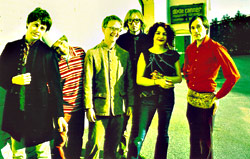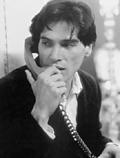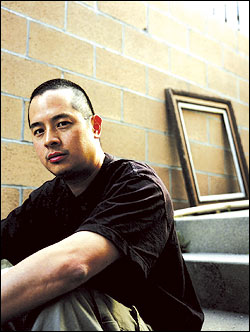In the mid-to-late ’90s, indie rockers were all abuzz over a group of emotive mushballs from Athens, Ga. But unlike the early-to-late ’80s, when R.E.M. led a claque of similarly fuzzy guitar bands from the same city, the ’90s version had more than a hometown in common. The Elephant 6 collective—they were always referred to as a “collective,” long before Canadian rock-bands-by-any- other-definition picked up on the term—was a loose conglomeration of artists that originally released music on their own label, Elephant 6, before breaking off into other record deals and getting popular outside of Athens. They shared a penchant for tuneful psychedelic pop-rock, often dosed with a sense of whimsy whether giddy (the Apples in Stereo) or pensive (Neutral Milk Hotel), and many of their arrangements came from Apples frontman Robert Schneider.
The Apples, NMH, and Olivia Tremor Control formed the front guard of the unit; a handful of others brought up the rear, including Of Montreal, led by earnest, nasal singer-songwriter-imagineer Kevin Barnes. From its title on down, Of Montreal’s 1997 debut, Cherry Peel, was more or less Apples redux—short, slaphappy, sing-along dork-pop perfect for pretending you were still living in a time when LSD hadn’t yet been criminalized. Indeed, most of the albums that followed Cherry Peel, even splendid ones like 1999’s Gay Parade, were easy to dismiss as retro exercises and nothing more, however acute Barnes’ tunes and arrangements became.
“When we first started making records, it was psychedelic ’60s pop stuff, real cinematic, [with] more bizarre arrangements,” he says from Honolulu, where he’s just begun the latest tour behind The Sunlandic Twins (Polyvinyl), Of Montreal’s most recent and best album. “When I first got into recording my own stuff, this whole world opened up for me. It’s my escape from the boredom of life.”
As the band matured, Barnes became more restless. Around the time of The Gay Parade and 2001’s Coquelicot Asleep in the Poppies: A Variety of Whimsical Verse, he says, “We started experimenting more with key changes and signature changes. I was just like, at that point, ‘Good music should not be predictable at all. Predictability is the absolute worst thing you can have in the song.’ And it’s kind of a struggle—you want it to be listenable . . . and you want it to resonate with people.”
Eventually, though, he felt like the band was getting stuck in a florid rut. 2002’s Aldhils Arboretum was, Barnes says, “our attempt to water it down to some degree. Not like [it’s] a sellout record, but kind of like, ‘We’ll see what happens when we don’t have a million guys,’ which makes it seem totally claustrophobic. We were trying to make a more conventional pop record—the songs [would] still have some interesting little twist, but it would be a rock band trying it: two guitars, a keyboard, bass, drums, and vocals. That was, like, not fulfilling at all. We didn’t ever want to do that again.”
Shortly after that, the original Of Montreal lineup imploded. “Four of our members [at the time] were living in a house in the country in Georgia,” says Barnes. “It [was] kind of an insular experience—we were out in the middle of nowhere, we had all this land around us, [and] in some ways it was great because we could make music day and night and no one would ever call the cops on us. We could be as free as we wanted to.” But an intraband power struggle came to a head after the Aldhils tour, which prompted Barnes to begin working on 2002’s Satanic Panic in the Attic by himself. “I got married, moved into a house with my wife, and I was really happy and comfortable and started to rediscover the joys of recording without anybody second-guessing [or] getting upset because they weren’t able to play this one part or being as involved as they wanted to be.”
That joy is all over The Sunlandic Twins as well—so much so that in the credits, the “produced, arranged, composed, performed, engineered, and mixed by” is followed by a crossed-out “Prince” before Barnes’ name is inserted. It’s cheeky, but it fits—if Of Montreal’s earlier albums were primarily about tune and arrangement, here Barnes beefs up the rhythms. No one’s gonna mistake it for full-on funk, but the pulse of the album’s best song, sporting one of OM’s most grandiosely awkwardly titles, “Wraith Pinned to the Mist and Other Games” (the chorus would have yielded a better name: “Let’s pretend we don’t exist/Let’s pretend we’re in Antarctica”), could build a fire on even a non-indie-rock dance floor.
That’s the idea, according to Barnes. “I wanted a song that people would freak when they heard it at a club,” he says. “I [had gotten] into Afrobeat, stuff like Fela Kuti and Tony Allen, the way they used the bass as the primary instrument. It’s the thing that holds it all together, and it’s also melodic—it really drives the whole machine. With ‘Wraith,’ I simplified [the arrangements] so things had more space, ’cause it’s just, like, a bass guitar and drum machine and vocals for almost the whole song and that’s something new for me— I could make something with a little more space and it has an even fuller sound.”
Does this mean that Barnes is moving Of Montreal’s retro-pop toward—gulp—the present? “There’s definitely more of a Bowie [circa] Low and Brian Eno [feel], ’cause I would get really into that [and] Queen, even some stuff like King Crimson,” he says, before admitting: “It seems a little predictable to go from the ’60s to the ’70s. There’s actually some ’80s stuff in there, too. So maybe I am slowly going to become contemporary.”
Of Montreal play Chop Suey with Grand Buffet, DJ Jester the Filipino Fist, and MGMT at 8 p.m. Tues., Jan. 31. $12 adv. All ages.








